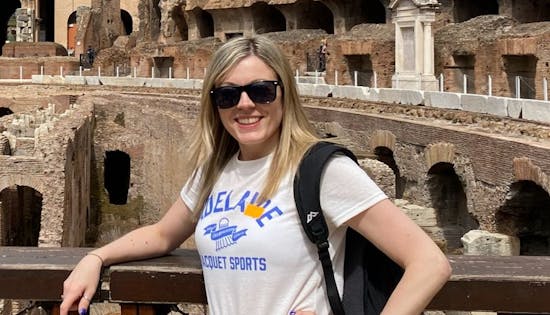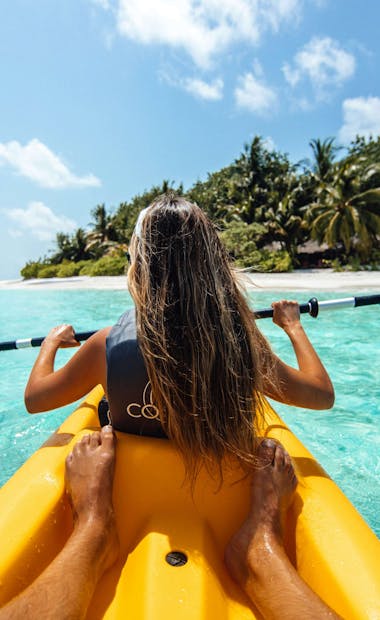Kenya Tours
Trek Kilimanjaro, discover wildlife on safari and walk with the Masai
Popular tours
- Save26%
 View Tour
View TourKenya Camping Safari - 9 Days
- Nairobi to Nairobi
- Age group: 12 - 100
- Max group size: 14
Was:£1,899From£1,410 - Save16%
 View Tour
View TourJourneys: Kenya Safari Experience - 8 Days
- Nairobi to Nairobi
- Age group: 12 - 100
- Max group size: 6
Was:£3,699From£3,113 - Save21%
 View Tour
View TourKenya: Cultural Connections, Mt Kenya & Maasai Mara - 10 Days
- Nairobi to Nairobi
- Age group: 18 - 100
- Max group size: 12
Was:£7,129From£5,646 - Save1%
 View Tour
View TourKenya Wildlife Safari - 8 Days
- Nairobi to Nairobi
- Age group: 15 - 99
- Max group size: 22
Was:£1,085From£1,074 - Save1%
 View Tour
View TourKenya Family Safari - 8 Days
- Nairobi to Nairobi
- Age group: 5 - 99
- Max group size: 16
Was:£1,650From£1,634 - Save1%
 View Tour
View TourPremium Kenya - 7 Days
- Nairobi to Nairobi
- Age group: 15 - 99
- Max group size: 12
Was:£3,550From£3,514
Kenya Tours
Welcome to the land of enchantment, where breathtaking landscapes meet vibrant cultures, and wildlife roams freely across the savannah. Discover the magic of Kenya, a captivating destination that promises unforgettable adventures and remarkable experiences. At our travel agency, we specialize in creating extraordinary Kenya tours and holidays that will immerse you in the beauty and diversity of this incredible country.
Kenya, nestled in the heart of East Africa, boasts a kaleidoscope of natural wonders that will leave you awe-inspired. From the iconic savannahs of the Maasai Mara, where the Great Migration unfolds with thundering hooves and mighty roars, to the snow-capped peaks of Mount Kilimanjaro, Kenya offers a plethora of opportunities to witness nature's grandeur.
For wildlife enthusiasts, a safari through Kenya's world-renowned national parks and reserves is an absolute must. Amboseli National Park, with its vast elephant herds set against the backdrop of Mount Kilimanjaro, provides an extraordinary setting for game drives. The Maasai Mara Reserve, famous for its abundant wildlife and thrilling predator-prey interactions, is a wildlife lover's paradise. Be prepared to witness the primal drama of nature unfolding right before your eyes.
Kenya's coastal region offers a contrasting tapestry of turquoise waters, pristine beaches, and ancient Swahili culture. The idyllic beaches of Mombasa and Diani Beach are perfect for relaxation and water sports, while Lamu Island takes you back in time with its centuries-old architecture and narrow winding streets. Explore the vibrant markets, sample tantalizing coastal cuisine, and soak up the laid-back coastal vibes.
But Kenya's allure goes beyond its natural wonders. Immerse yourself in the rich traditions and cultures of its diverse ethnic communities. The Maasai people, with their striking red attire and enduring traditions, welcome you into their villages, offering a glimpse into their way of life. Engage with the Samburu, Turkana, and Kikuyu communities, each with their distinct customs and heritage.
For the adventurous souls, Kenya presents an array of thrilling activities. Embark on an exhilarating hot air balloon safari over the Maasai Mara at sunrise, capturing panoramic views of the vast plains and its inhabitants. Challenge yourself to a trek through the breathtaking landscapes of Mount Kenya, the second-highest peak in Africa, or dive into the crystal-clear waters of the Indian Ocean to explore vibrant coral reefs teeming with marine life.
Visiting Kenya is not just an expedition into natural beauty and cultural diversity; it is an opportunity to make a positive impact on local communities and conservation efforts. Engage in responsible tourism by participating in community-led projects, supporting local artisans, and contributing to wildlife conservation initiatives.
With its awe-inspiring landscapes, abundant wildlife, rich cultures, and immersive experiences, Kenya has something to offer every traveler seeking adventure, discovery, and connection. Let our travel agency craft your dream Kenya tour or holiday, ensuring every moment is filled with wonder and enchantment. Get ready to create lifelong memories in the magical land of Kenya.
When is the best time to visit Kenya?
The best time to visit Kenya depends on the specific experiences you're seeking and the regions you plan to explore. Kenya enjoys a diverse climate due to its varying landscapes, ranging from coastal regions to highland areas and savannah plains. Generally, there are two main seasons to consider: the dry season and the wet season.
The dry season, which spans from late June to October, is considered the peak tourist season in Kenya. During this time, the weather is generally warm and dry, offering excellent wildlife viewing opportunities. The famous Maasai Mara wildebeest migration usually occurs between July and October, making it a particularly popular time to witness this natural spectacle.
Another favorable time to visit is during the short dry season, which falls between January and February. This period offers pleasant weather and excellent wildlife sightings. It's also a great time to visit the coastal areas, with warm temperatures and minimal rainfall.
However, if you're interested in birdwatching, the wet season, which runs from November to May, may be ideal. During this time, the landscapes transform into lush greenery, and birdlife flourishes. The scenery is stunning, and you can enjoy lower rates and fewer crowds.
It's important to note that Kenya's climate can vary significantly between regions. Coastal areas, such as Mombasa and Diani Beach, have a tropical climate and can be visited year-round. Highlands and mountainous regions, like Mount Kenya, experience cooler temperatures and may require warmer clothing, even during the dry season.
Ultimately, the best time to visit Kenya depends on your preferences, whether you prioritize wildlife sightings, weather conditions, or specific activities. We recommend consulting with our travel experts who can tailor your itinerary based on your desired experiences and the optimal time for your visit.
Will I need a visa to travel to Kenya?
Yes, most visitors to Kenya will require a visa to enter the country. However, visa requirements can vary depending on your nationality and the purpose of your visit. It's essential to check the specific visa requirements for your country of residence before traveling to Kenya.
For many nationalities, Kenya offers an electronic visa (eVisa) system, which allows travelers to apply for and obtain their visa online prior to their trip. The eVisa is valid for tourism, business, and medical purposes and typically grants a stay of up to 90 days. The application process is straightforward and requires basic information, such as passport details and travel plans.
Some nationalities may be eligible for visa-free entry or visa on arrival, allowing them to obtain a visa upon arrival at select entry points in Kenya. However, it's advisable to check the current visa regulations and requirements well in advance of your travel dates.
Additionally, it's important to ensure that your passport is valid for at least six months beyond your planned departure date from Kenya. It should also have blank pages for entry and exit stamps.
To avoid any last-minute complications, we recommend contacting the Kenyan embassy or consulate in your country or consulting with our travel agency for the most up-to-date and accurate information regarding visa requirements for your specific situation.
What are the must see destinations in Kenya?
Kenya offers a wealth of must-see destinations that showcase its natural beauty, diverse wildlife, and rich cultural heritage. Here are some of the top destinations you should consider including in your itinerary:
Maasai Mara National Reserve: Known for its exceptional wildlife sightings and the Great Migration, the Maasai Mara is a wildlife enthusiast's paradise. Witness vast herds of wildebeest, zebra, and antelope, as well as predators like lions, cheetahs, and leopards, in their natural habitat.
Amboseli National Park: Located at the foot of Mount Kilimanjaro, Amboseli offers breathtaking views of Africa's highest peak. It's famous for its large herds of elephants and is also home to a variety of other wildlife, including giraffes, buffalos, zebras, and numerous bird species.
Mount Kenya: Scale the heights of Mount Kenya, Africa's second-highest peak, and be rewarded with stunning panoramic views. This majestic mountain offers diverse landscapes, from dense forests to rugged moorlands, and is a haven for hikers, climbers, and nature enthusiasts.
Lake Nakuru National Park: Renowned for its vast flocks of flamingos, Lake Nakuru National Park is a bird lover's paradise. The park also hosts a wide range of wildlife, including rhinos, giraffes, zebras, and lions, against the backdrop of the shimmering lake.
Tsavo National Parks: Tsavo East and Tsavo West National Parks together form one of the largest wildlife sanctuaries in the world. These parks are known for their vast open savannahs, dramatic landscapes, and a wide array of wildlife, including elephants, lions, zebras, and buffalo.
Samburu National Reserve: Located in the arid northern region, Samburu offers a unique safari experience. Encounter rare species such as the reticulated giraffe, Grevy's zebra, Somali ostrich, and the Samburu "Special Five" - the Beisa oryx, Somali ostrich, gerenuk, reticulated giraffe, and Grevy's zebra.
Nairobi: Kenya's vibrant capital city has its share of attractions. Visit the Nairobi National Park, a unique wildlife reserve on the outskirts of the city, or explore the Karen Blixen Museum, which provides insights into the author's life depicted in "Out of Africa." The bustling markets, museums, and cultural centers offer a glimpse into Kenya's history and contemporary culture.
Diani Beach: Located along the picturesque coastline of Mombasa, Diani Beach is a tropical paradise with pristine white sands and turquoise waters. Relax, indulge in water sports, or explore the nearby marine reserves and coral reefs.
These are just a few of the many incredible destinations Kenya has to offer. Each region boasts its own unique attractions, wildlife, and cultural experiences, ensuring that your journey through Kenya will be filled with extraordinary encounters and lifelong memories.
What is the local currency in Kenya, and can I use credit cards?
The local currency in Kenya is the Kenyan Shilling (KES). It is advisable to carry some local currency for small purchases, local markets, and smaller establishments that may not accept credit cards. You can exchange your currency for Kenyan Shillings at banks, currency exchange offices, and authorized forex bureaus in major cities and towns.
Credit cards are widely accepted in many hotels, restaurants, and larger establishments in urban areas such as Nairobi and Mombasa. Visa and Mastercard are the most commonly accepted credit cards, while American Express and Diners Club may have more limited acceptance. However, it's important to note that some smaller businesses and rural areas may not accept credit cards, so it's always advisable to carry some cash for such situations.
ATMs are widely available in cities and towns, allowing you to withdraw cash in the local currency using your debit or credit card. However, it's recommended to inform your bank about your travel plans to ensure that your card will work smoothly in Kenya. It's also advisable to have a backup payment method, such as a second card or traveler's checks, in case of any unforeseen circumstances.
For larger expenses, such as safari bookings or luxury accommodations, it's common to pay by credit card. However, keep in mind that some establishments may charge a convenience fee for credit card transactions, so it's worth checking with the specific service provider in advance.
Overall, it's a good idea to carry a combination of local currency and a widely accepted credit card to ensure smooth transactions during your time in Kenya.
Is Kenya a good family holiday destination?
Absolutely! Kenya is a fantastic family holiday destination with a wide range of activities and attractions that cater to travelers of all ages. Here are some reasons why Kenya is an excellent choice for a family vacation:
Wildlife and Safari Experiences: Kenya is renowned for its incredible wildlife and safari opportunities. Going on a family safari allows you and your loved ones to witness majestic animals in their natural habitats, creating unforgettable memories. Seeing elephants, lions, giraffes, and other animals up close is an awe-inspiring experience for children and adults alike.
Educational Opportunities: Kenya provides unique educational opportunities for children. They can learn about different animal species, ecosystems, and conservation efforts through interactive experiences. Many safari lodges and wildlife centers offer educational programs specifically designed for children, combining fun and learning.
Cultural Immersion: Kenya's rich cultural heritage offers a chance for families to immerse themselves in local traditions and interact with diverse ethnic communities. Visiting Maasai villages, learning about their customs, and participating in traditional activities like beadwork or spear throwing can be both educational and enjoyable.
Beautiful Beaches: Kenya's stunning coastline, with its white sandy beaches and turquoise waters, offers a perfect setting for a family beach vacation. Relax, play in the sand, swim, and engage in various water sports like snorkeling or sailing. The coastal towns of Mombasa and Diani Beach are particularly popular for family-friendly resorts and activities.
Outdoor Adventures: Kenya provides a wide array of outdoor activities suitable for families. From hiking in scenic landscapes to horseback riding, camel treks, and cycling safaris, there are plenty of options to keep the whole family entertained and active.
Child-Friendly Accommodations: Kenya offers a range of family-friendly accommodations, including safari lodges and resorts that cater to the needs of families. Many provide amenities like swimming pools, kids' clubs, and specialized meals for children.
Safety and Accessibility: Kenya is generally a safe destination for tourists, and the major tourist areas are well-developed and easily accessible. The country has established tourism infrastructure and a welcoming attitude toward families, ensuring a comfortable and enjoyable experience.
When planning a family holiday in Kenya, it's recommended to work with a trusted travel agency that can assist in designing an itinerary that suits your family's interests and preferences. They can arrange suitable accommodations, select child-friendly activities, and provide guidance throughout your trip, ensuring a memorable and hassle-free experience for the whole family.
Is Kenya a good destination for solo travellers?
Yes, Kenya is a fantastic destination for solo travellers seeking adventure, cultural immersion, and incredible experiences. Here are some reasons why Kenya is an excellent choice for solo travelers:
Warm and Welcoming People: Kenyans are known for their warm hospitality and friendliness. As a solo traveller, you can expect to be greeted with warmth and kindness, making it easy to connect with locals and fellow travellers.
Diverse Experiences: Kenya offers a wide range of experiences to cater to different interests. Whether you're interested in wildlife safaris, hiking, cultural immersion, or beach relaxation, Kenya has something for everyone. You can choose activities that align with your preferences and create a personalised itinerary.
Safe and Secure: Kenya is generally a safe destination for travellers, including solo travellers. Like any travel destination, it's important to exercise basic precautions, such as staying aware of your surroundings, avoiding isolated areas at night, and keeping your belongings secure. However, with common-sense precautions, solo travelers can enjoy a safe and memorable trip in Kenya.
Guided Tours and Group Activities: Joining guided tours and group activities is a great way for solo travellers to explore Kenya. We offer many group safaris, cultural tours, and adventure activities that allow you to meet like-minded travelers and share experiences together. It can also provide an added level of convenience and safety during your trip.
Cultural Immersion: Kenya's diverse cultures and ethnic communities provide ample opportunities for solo travelers to immerse themselves in local traditions, interact with locals, and gain unique insights into the country's rich heritage. From visiting Maasai villages to participating in cultural ceremonies, solo travellers can engage in meaningful cultural exchanges.
Solo-Friendly Accommodations: Kenya offers a range of accommodations suitable for solo travellers, including guesthouses, lodges, and backpacker hostels. These establishments often provide a friendly and social atmosphere, making it easy to meet fellow travellers and share experiences.
Natural Beauty and Adventure: From the vast savannahs of the Maasai Mara to the snow-capped peaks of Mount Kenya, Kenya's natural beauty provides a stunning backdrop for solo adventures. Whether you're embarking on a wildlife safari, trekking through scenic landscapes, or engaging in thrilling outdoor activities, the country offers endless opportunities for adventure and exploration.
While traveling solo in Kenya can be an enriching experience and even more so in a small group tour, it's always a good idea to stay informed, plan your itinerary in advance, and follow any travel advisories or guidelines issued by your embassy or relevant authorities.
Is Kenya a safe destination?
Kenya is generally considered a safe destination for tourists. However, like any travel destination, it's important to exercise caution and take necessary precautions to ensure a safe and enjoyable trip. Here are some key points to consider regarding safety in Kenya:
Security Precautions: It's advisable to stay informed about the current situation in the country before your trip. Check travel advisories issued by your embassy or government to get updated information about any safety concerns or potential risks in specific regions. Registering with your embassy or consulate is also recommended, so they can reach you in case of emergencies.
Urban Areas: Major cities like Nairobi and Mombasa have their share of crime, including petty theft and pickpocketing. It's essential to be vigilant, especially in crowded areas, markets, and public transportation. Avoid displaying valuable items openly and be cautious when using ATMs.
Personal Belongings: Keep your belongings secure at all times, particularly in crowded places and tourist areas. Use a money belt or a secure bag to carry your passport, cash, and important documents. Avoid carrying large sums of money or wearing expensive jewelry that may attract unwanted attention.
Transportation: Use reputable taxi services or arrange transportation through trusted sources. When using public transportation, be cautious of your belongings and choose well-marked and licensed vehicles. It's also advisable to prearrange airport transfers to ensure a smooth and safe arrival.
Wildlife Encounters: When on safari or visiting national parks, it's crucial to follow the instructions of experienced guides and park rangers. Keep a safe distance from wild animals and avoid any behaviors that may disturb or provoke them.
Health and Hygiene: As with travel to any destination, it's important to take necessary health precautions in Kenya. Consult with a healthcare professional or travel clinic to get up-to-date information on vaccinations and preventive measures for diseases like malaria, typhoid, and others. Drink bottled or treated water and maintain good hygiene practices.
Local Knowledge: Engage with locals, tour guides, and trusted travel agencies to gain insights into local customs, cultural norms, and any specific safety advice for the areas you plan to visit. They can provide valuable information and help you navigate your travels smoothly.
By staying informed, using common sense, and following local guidelines, you can enjoy a safe and memorable experience in Kenya. Remember that unexpected incidents can occur anywhere, so it's important to have travel insurance that covers medical emergencies, trip cancellations, and other unforeseen situations.
Will I require any vaccinations to travel to Kenya?
Yes, it is recommended to have certain vaccinations before traveling to Kenya. The specific vaccines you need may depend on various factors, including your current health status, previous immunizations, the duration of your stay, and the areas you plan to visit. Here are some common vaccinations recommended for travelers to Kenya:
Routine Vaccinations: Ensure that your routine vaccinations, such as measles-mumps-rubella (MMR), diphtheria-tetanus-pertussis, varicella (chickenpox), polio, and influenza, are up to date.
Yellow Fever: Kenya requires a valid yellow fever vaccination certificate for travelers arriving from countries with a risk of yellow fever transmission. This vaccination is crucial as it protects against the mosquito-borne disease. Even if not specifically required, it's recommended for all travelers as a precautionary measure.
Typhoid: Typhoid fever can be contracted through contaminated food and water. Vaccination against typhoid is recommended for travelers, especially those visiting rural areas or staying for an extended period.
Hepatitis A: This vaccine protects against the hepatitis A virus, which can be transmitted through contaminated food and water. It is generally recommended for all travelers to Kenya.
Hepatitis B: Hepatitis B is transmitted through contact with blood or body fluids, such as sexual contact, contaminated needles, or medical procedures. The vaccine is recommended for travelers who may have intimate contact with locals, require medical treatment, or engage in activities that may expose them to the virus.
Malaria: While there is no vaccine for malaria, it is a prevalent disease in certain parts of Kenya. It's crucial to take antimalarial medications and adopt preventive measures, such as using mosquito repellents, wearing protective clothing, and sleeping under insecticide-treated bed nets.
It's important to consult with a healthcare professional or travel clinic at least 4-6 weeks before your trip to discuss the specific vaccinations required for your travel plans. They will consider your individual health history, current recommendations, and any specific factors related to your trip to provide personalized advice and administer the necessary vaccines.
Remember to carry your vaccination certificates or records with you during your trip as proof of immunization, especially for yellow fever.
How does the rooming work on tours?
Small group tours in Kenya typically involve a set itinerary where you travel with a group of fellow travellers and a tour leader/guide. Accommodation arrangements vary depending on the specific tour you choose. Here are some common aspects of rooming arrangements on small group tours:
Shared Rooms: In order to promote camaraderie and facilitate interaction among group members, most tours arrange shared accommodation. This means you will be paired with another member of the same gender from the group to share a room. Roommates may sometimes change periodically throughout the tour.
Single Supplement: If you prefer to have your own room and privacy, you may have the option to pay a single supplement fee. This additional fee allows you to have your own room for the duration of the tour. However, please note that single supplements can vary in cost and availability.
Roommate Matching: Tour operators usually offer roommate matching services, where they try to pair you with a suitable roommate based on your preferences, such as age range. This can help ensure compatibility and a more enjoyable experience for all participants.
Rooming Preferences: When booking your small group tour, it's important to communicate your rooming preferences to the tour operator. If you have specific requirements or preferences, such as sharing with a friend or a specific roommate request, it's advisable to inform the tour operator during the booking process.
It's important to carefully read the tour details and inclusions provided by the tour operator to understand their specific rooming policies. If having your own room is a priority, make sure to inquire about the availability of single supplements and any associated costs before booking your tour.
Keep in mind that while sharing a room with a fellow traveller can be a great way to meet new people and build connections, having your own room provides more privacy and flexibility. Consider your preferences and the dynamics of the tour when deciding whether to opt for a shared room or pay for a single supplement.
Remember to communicate your needs and preferences clearly with the tour operator during the booking process to ensure a comfortable and enjoyable accommodation experience on your small group tour in Kenya.
What is the food like in Kenya?
Kenyan cuisine is diverse, flavorful, and influenced by various ethnic groups, regional ingredients, and cultural traditions. Here's an overview of the food in Kenya:
Ugali: Ugali is a staple food in Kenya, made from maize flour (cornmeal) cooked with water to form a thick, dough-like consistency. It is typically served with sukuma wiki (collard greens), nyama choma (grilled meat), or traditional stews.
Nyama Choma: Nyama choma refers to grilled or barbecued meat, often goat or beef, which is marinated and then roasted over an open fire. It is commonly enjoyed with ugali and accompanied by kachumbari (tomato and onion salad) and a side of spicy sauce.
Pilau: Pilau is a fragrant and spiced rice dish cooked with meat (such as chicken, beef, or goat), vegetables, and a blend of spices like cumin, cardamom, cloves, and cinnamon. It is often served during special occasions and gatherings.
Chapati: Chapati is a flatbread made from wheat flour and is similar to Indian roti or tortilla. It is a popular accompaniment to many Kenyan dishes and is also enjoyed on its own.
Sukuma Wiki: Sukuma wiki is a Swahili term for collard greens, which are sautéed with onions, tomatoes, and spices. It is a common and nutritious vegetable dish in Kenya, often served alongside ugali or as a side dish with other meals.
Samosas: Samosas are triangular pastries filled with savory ingredients like spiced meat, vegetables, or lentils. They are a popular street food snack in Kenya and can be found in local markets and food stalls.
Mandazi: Mandazi is a popular Kenyan snack similar to donuts. These deep-fried dough balls are often flavored with coconut milk and can be enjoyed plain or dusted with powdered sugar.
Fresh Fruits: Kenya is known for its abundance of fresh fruits, including mangoes, pineapples, papayas, bananas, and passion fruits. These fruits are widely available, delicious, and make for refreshing snacks or additions to meals.
Nyama Mama: Nyama Mama is a contemporary Kenyan restaurant chain that offers a fusion of traditional Kenyan dishes with modern twists. It's a great place to experience Kenyan flavors in a vibrant and trendy setting.
Street Food: Kenyan street food is a vibrant and diverse culinary experience. You can find a variety of snacks and quick bites like roasted maize, boiled eggs, samosas, grilled meats, and chapatis being sold by street vendors.
Kenya also has a growing food scene with restaurants and eateries that cater to different tastes and cuisines, including international options. From traditional dishes to modern culinary creations, there's something to satisfy every palate in Kenya.
Can I drink the tap water in Kenya?
It is generally not recommended to drink tap water in Kenya, especially for visitors who are not accustomed to the local water supply. The tap water may contain bacteria, parasites, or other contaminants that can cause illness, particularly for those with more sensitive stomachs.
To stay hydrated and ensure safe drinking water, it is advised to rely on bottled water or properly treated water. Bottled water is widely available in Kenya and can be purchased from supermarkets, hotels, and other authorized vendors. Look for sealed bottles from reputable brands to ensure quality and safety.
If you are staying in accommodations with access to filtered or treated water, you can also use that for drinking and brushing your teeth. Boiling tap water for at least one minute is another method to make it safe for consumption.
In addition to drinking water, be cautious when consuming beverages with ice cubes or consuming raw foods that may have been washed in tap water. It's best to opt for cooked foods and fruits that can be peeled to minimize the risk of contamination.
Staying hydrated is essential, particularly in Kenya's warm climate, so make sure to have an adequate supply of safe drinking water with you at all times. By taking these precautions, you can help ensure a healthy and enjoyable trip to Kenya.
Are there any cultural norms in Kenya I should follow?
Yes, when visiting Kenya, it's respectful to be aware of and follow certain cultural norms and practices. Here are some important cultural norms to keep in mind:
Greetings: Greetings are highly valued in Kenyan culture. When meeting someone, it is customary to greet them with a handshake and a verbal exchange of pleasantries. It's polite to greet elders first and use respectful language when addressing them.
Dress Code: Kenya is a diverse country with various cultural and religious beliefs. It's recommended to dress modestly and respectfully, especially when visiting religious sites, rural areas, or interacting with local communities. Revealing clothing may be seen as disrespectful or offensive.
Public Displays of Affection: Public displays of affection, such as kissing or hugging, are generally not common in Kenyan culture. It's advisable to exercise restraint and follow local customs regarding personal interactions.
Respect for Elders: Elders hold a special place in Kenyan society, and it is important to show them respect. This can be done by using polite language, listening attentively, and seeking their advice or guidance when appropriate.
Cultural Sensitivity: Kenya is home to various ethnic communities, each with its own cultural practices and traditions. It's essential to be respectful and open-minded towards different customs and beliefs. Seek permission before taking photographs of individuals or sacred places, and be mindful of cultural sensitivities.
Food Customs: When invited to someone's home for a meal, it is customary to remove your shoes before entering. It's polite to accept food or drinks offered to you, as declining may be seen as impolite. In some cultures, eating with the right hand is customary, as the left hand is considered unclean.
Language: English and Swahili are widely spoken in Kenya, but it's appreciated when visitors make an effort to learn a few basic Swahili phrases, such as greetings and thank you. Using local greetings like "Jambo" (hello) or "Asante" (thank you) can go a long way in showing respect and building rapport.
Wildlife and Conservation: When participating in wildlife safaris or visiting national parks, it's important to follow the instructions of park rangers and guides. Maintain a safe distance from animals, avoid littering, and respect the environment to contribute to conservation efforts.
By being mindful of these cultural norms and practices, you can show respect for the local customs and create a positive and enriching experience during your visit to Kenya.
What should I pack for a trip to Kenya?
When packing for a trip to Kenya, it's essential to consider the climate, activities, and cultural norms. Here's a suggested packing list to help you prepare:
Clothing:
- Lightweight and breathable clothing: Pack lightweight, loose-fitting clothes made of natural fibers like cotton or linen to stay comfortable in Kenya's warm climate.
- Long-sleeved shirts and pants: These will protect you from the sun, mosquitoes, and provide warmth during cooler evenings.
- Comfortable walking shoes: Choose sturdy, comfortable shoes suitable for walking and outdoor activities. Sneakers or hiking shoes are recommended.
- Swimwear: If you plan to visit coastal areas or lakes, pack swimwear for enjoying the beaches or swimming opportunities.
- Scarf or shawl: Useful for covering shoulders or head when visiting religious sites or as a modesty cover.
- Light jacket or sweater: Evenings can get cooler, especially in higher-altitude areas or during the rainy season, so a light jacket or sweater will come in handy.
Protective Accessories:
- Sun hat or cap: Protect yourself from the sun by packing a wide-brimmed hat or cap.
- Sunglasses: Choose sunglasses with UV protection to shield your eyes from the sun.
- Sunscreen: Carry sunscreen with a high SPF to protect your skin from the strong African sun.
- Insect repellent: Mosquitoes can be prevalent in certain areas, so pack an insect repellent with DEET or other recommended ingredients.
Travel Essentials:
- Travel adapter: Kenya uses Type G electrical outlets, so bring a suitable travel adapter to charge your electronic devices.
- Portable charger: Keep a portable charger handy for charging your phone or camera on the go.
- Travel documents: Carry your passport, visa, and any other necessary travel documents in a secure and easily accessible place.
- Money: Carry some local currency (Kenyan Shillings) in small denominations for convenience, along with international credit/debit cards.
Health and Hygiene:
- Prescription medications: If you take any prescription medications, ensure you have an adequate supply for the duration of your trip.
- Basic first aid kit: Pack a small kit with essentials like band-aids, antiseptic cream, pain relievers, and any personal medications.
- Hand sanitizer: Carry a small bottle of hand sanitizer for maintaining hand hygiene while traveling.
- Toiletries: Pack travel-sized toiletries, including soap, shampoo, toothpaste, and a travel toothbrush.
- Wet wipes or tissues: Useful for freshening up or cleaning hands when access to water is limited.
Miscellaneous:
- Camera and binoculars: Kenya offers incredible wildlife and scenic views, so a camera and binoculars will enhance your experience.
- Daypack or backpack: Carry a small backpack or daypack for daily outings, storing water, snacks, and other essentials.
- Travel guidebook or maps: Carry a guidebook or map for reference and assistance in navigating your destinations.
- Reusable water bottle: Stay hydrated by carrying a reusable water bottle and refill it with safe drinking water.
Remember to check the specific requirements for your trip, such as clothing recommendations for safari tours or specific activities you plan to undertake. Also, consider the duration of your trip and the availability of laundry facilities at your accommodations.
Pack light and prioritize essential items, considering the baggage restrictions of airlines and the convenience of moving around during your trip.
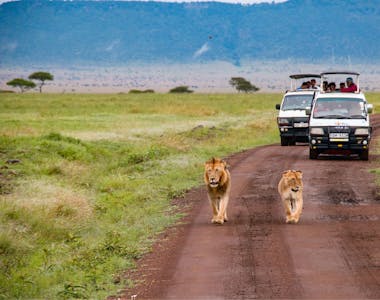
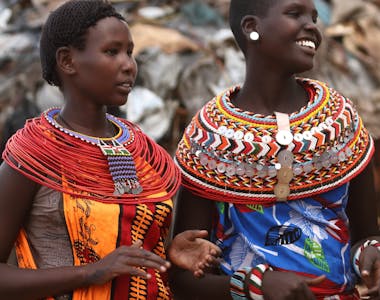
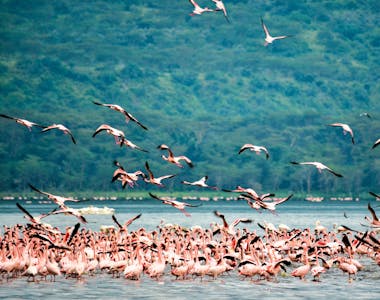
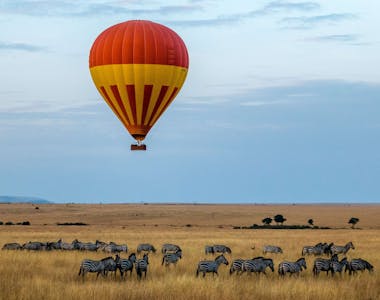
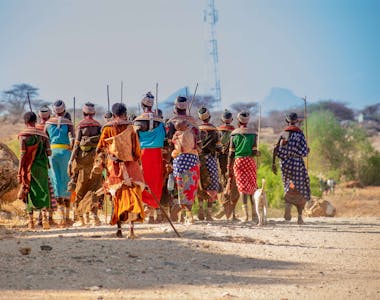
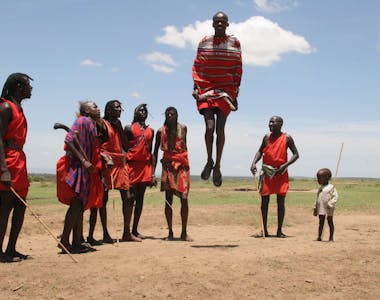
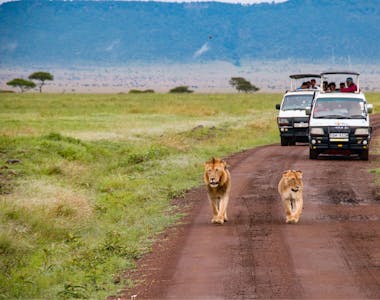
Book With Confidence
Monthly Payments
Spread the costs with no interest or additional fees
Best Price Guarantee
We won't be beaten on price. If you find this adventure at a lower price please get in touch!
Reserve now & pay later
Reserve your adventure today and pay later, free of charge
ATOL protected
Book with confidence
Hold your space today, for free
or book your trip with a deposit and then pay the rest in instalments.
Reserve your flights with us
Add flights to your booking and we'll take care of the rest. You'll get 24/7 support from our team & ATOL protection.
Speak to our experts
Call or email our expert team to find out more and help with ideas and planning.
